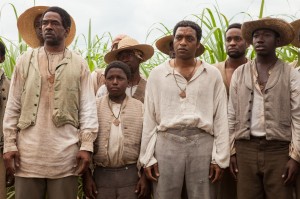(ThyBlackMan.com) I have never felt more strongly compelled to write a blog than I am to write this one. The Doug Banks syndicated radio show, which features adult conversation call-ins mixed with music, recently asked the question of its audience as to whether Hollywood was exploiting slavery with all its slave films or if they were trying to tell the story of African Americans. Banks wondered aloud why Hollywood makes such films if black people don’t want to see them. I couldn’t listen to all of the callers, but those I heard expressed ire at seeing their forbearers treated worse than animals.
A few days later, I picked up a copy of the Redeye, a free weekly paper published by the Chicago Tribune, aimed at younger people, and read a column by a young African American, Ernest Wilkins, who explained why he had no intentions of seeing the slave film, “12 years a Slave,” or any other films dealing with slavery. Wilkins wrote, “I have no interest in seeing guys who look like me being treated like cattle.”
I’ve been deeply troubled for some time by the apparent disconnect between younger African Americans and their history. Helplessly I’ve watched as the lessons gleaned in the late ‘60’s and early 70’s (a time of political and cultural renaissance in the black community) were not only lost but eviscerated as evidenced by black women being regarded as female dogs as opposed to “Nubian Queens, ” young men showing their underwear, and the list goes on. The reasons for this disconnect are myriad and complex. Yet the reaction to the film”12 years a slave” has finally given me something tangible to begin to address this issue.
The reasons for this disconnect are myriad and complex. Yet the reaction to the film”12 years a slave” has finally given me something tangible to begin to address this issue.
I am not writing this to castigate any African Americans for having reservations about vicariously experiencing slavery through film. Such unbelievable cruelty toward one’s people is indeed difficult to watch. It’s painful for me to watch as well. I am writing as a village elder, trying desperately to send a message to subsequent generations (and perhaps to some members of my own generation) on why our entire story- be it slavery or ancient African dynasties- must always be told. First, the enslavement of black folks is NOT something for which we should feel shame. The shame in slavery falls on the perpetrators, not the victims.
While there is no pride in our having been slaves, there is enormous pride in the fact that we persevered. No matter how much self hatred they tried to beat into us, no matter how much denigration, humiliation and terror they tried to strike they could never, ever, kill that indomitable will to be free. The more harsh the treatment, the more painful its presentation is to watch, the greater is the accomplishment of having survived it and gone on to incredible accomplishments. You cannot judge a race without at least having an idea of the starting point.
Second. Just as Neo Nazis have tried to deny the Holocaust, today’s racists deny that slavery was all that bad. Powerful and influential people like Rush Limbaugh, the unofficial Godfather of the Republican Party, and Glen Beck have created an alternative universe in which white folks are the victims of black oppression!! Over a year ago I wrote “Consider that the Texas Board of Education just a year ago tried to eliminate the word “slavery” from the slave trade in textbooks and rename it the “Atlantic triangular trade.” It’s not just white racists. Negro activist, Ben Carson further trivialized slavery when he said that Obamacare is the worst thing since slavery. Movies about the holocaust have to be painful for Jewish people to watch. They’re painful for me to watch. But Jewish people, quite rightfully, will never let the world forget what was done to them during that horrible period.
Third. In his column on why he won’t see “12 Years a Slave” or the upcoming remake of “Roots,” young Mr. Wilkins reports, “nothing will change.” Once again, this is an understandable reaction of frustration with the status quo. But the reality is that nothing will ever change, at least not for the better, until we at least understand the issues that framed and formed the problems we have right now. The underdevelopment of the African American community, the crime, the poor schools and poverty, all have their roots in slavery. Without a historical context, one could only assume that black folks are just horrific underachievers. That is why the racists are so keen on denying or whitewashing slavery. They maintain that the current plight of many black folks, just like slavery itself, is nothing more than a manifestation of the natural order of things.
Finally, (I use the word loosely for I haven’t begun to scratch the surface) a people with no history have no future. Without a shared culture and history, you do not have a people, you have a collection of individuals who look alike. I’ve met young people who celebrate the M L King Holiday, and the “I Have a Dream” speech, but have no idea of what Jim Crow was. Should we bypass the water hoses and church bombings of the ‘60’s as well, because they are too painful to watch? History is not something in books about people with whom we have no connection. By the act of living, we are participating in the same history in which the slaves participated.
If our young people understood that slaves risked their lives to learn to read and write, then maybe they would have a greater appreciation for education. If African Americans are ever to advance we must embrace all of our past, painful though it may be. If our ancestors could endure, the least we can do is acknowledge! This embrace must be done in a sense of pride in the enormous obstacles that we continue to strive to overcome. Sankofa. We have to look back to move forward.
Staff Writer; William Griggs
To view more of this talented brother work, head over to; http://www.WlliamGriggs.net.




















Thank you all for your comments. I did see the movie, “Sankofa”many years ago, that was how I learned the word in the first place. Hollywood is in the business of making money. Historically, Hollywood has made tons of movies that were almost as bad as “Birth of a Nation.” “Santa Fe Trail” comes to mind. And the list goes on. As was pointed out, “12 Years a Slave” was not a Hollywood movie, but if it was, that would not negate the value of this true historical film. The point is that we must support films that show the reality and brutality of slavery. There have been good movies about Black folks made that were not supported. Films like “Antoine Fisher” and “The Amistad” the story of Josephy Cinque’s successful revolt. “Amistad” could have been better, but we take what we can get.
I hope those of you who appreciate what I’m trying to do will spread the word. If our ancestors could live through it, we can endure the the film representation. We are standing on their shoulders.
Thank you all for your comments. I did see the movie, “Sankofa”many years ago, that was how I learned the word in the first place. Hollywood is in the business of making money. Historically, Hollywood has made tons of movies that were almost as bad as “Birth of a Nation.” “Santa Fe Trail” comes to mind. And the list goes on. As was pointed out, “12 Years a Slave” was not a Hollywood movie, but if it was, that would not negate the value of this true historical film. The point is that we must support films that show the reality and brutality of slavery. There have been good movies about Black folks made that ere not supported. Films like “Antoine Fisher” and “The Amistad” the story of Josephy Cinque’s successful revolt. “Amistad” could have been better, but we take what we can get.
A boy was running quickly to school. As he ran, he came upon a bird. It was lying on the ground shaking from the cold. The boy saw a fresh pile of cow shit and figured it would warm the bird. He put the bird in the shit and continued on his way. The boy was right. Soon, the bird felt better and began to sing. A near by fox heard the bird singing. The fox grabbed the bird and ate him.
There are 3 things to learn from this story.
1. The one that puts you in shit isn’t always your enemy.
2. The one that pulls you out isn’t always your friend.
3. When your up to your neck in shit it’s no time to sing.
Most of the authors just spit shit and all the blacks sing praise.
Terrance Amen,
I’m not trying to sell a worthless shit book on line.
@ Brother Smith and Sister Ann
Brother Smith I agree with you 100%, but I believe it’s up to us to make those kinds of movies. As you said Hollywood will never make movies that will uplift our people. This is why it’s so important for us to start working together, in order to create these opportunities and more. I talk about this in my book, we don’t need Hollywood, Hollywood needs our money. The only thing stopping us from becoming the best that we can be is us and that’s all we need to be focused on.
@ Sister Ann
Please don’t bother talking to that devil ewill. He’s not on this site to support our progress, he’s on it to talk mess and disrupt good constructive conversation. I don’t read his comments because he’s not worth commenting on. I suggest you do the same. Eventually he’ll get the message or continue to make comments to himself.
Black Unity means financial independence and happiness
Anne,
I’m not speaking about all blacks, just the 70-80% of the total I’ve come into contact with. My zip code isn’t 90210. I don’t live in a vacuum. My generalizations are from my personal experiences talking and listening to, working with, and being around blacks for about 60 years.
Read government(national, state, city) reports for current information.
Also, If I don’t think blacks understand history accurately, it doesn’t matter whether they got the information from books, the internet, or the spoken word, inaccurate is inaccurate.
Talking about generalizations and sweeping statements. That’s what most blacks do. When I listen to blacks talk these are some of the basic things they seem to believe.
Whites made blacks slaves
Only blacks were enslaved
Blacks were enslaved because of their color.
Blacks enslaved blacks from tribal wars and sold to finance more wars.
75% of those first coming to the American colonies were slaves, white indentured slaves. The first black slaves in America were considered and treated as indentured slaves.
FYI
Only about 6% of all slaves from Africa were used in the American colonies.
Less than 1M of the total 4M slaves came from Africa, over 75% were born in America.
Slave population in 1865 (the high point) was about 12% of the total population.
Only 4%-8% of all American families owned slaves.
Blacks also seem to be confused about some truths.
Blacks were mistreated, lived in unthinkable conditions,
were denied any rights, and brutally treated as animals.
These statements are true for places like the Caribbean, Jamaica, Hispaniola, Cuba, Honduras, Guatemala, … They are not true for the vast majority of slave owners in America
I understand there is never a truly kind slave master.
Even in America, Some slave masters were cruel.
Although there were all kinds of slave laws, most of them were ignored.
Most slaves were treated relatively kind. Allowed free time, church meetings, visits to relatives at other locations, trusted with money to do business, even protected by laws.
Slaves were taught to read and write. Most slave masters allowed the slaves to work for other people on there free time. Some slaves paid for their freedom from the extra work.
All of this is a generalization about slavery but, I believe it is more accurate version that blacks believe.
Also, The “Evill” is cleaver. LOL
Their are a few movies that have historical value and 12 years a slave is one of them. We should welcome any movie depicting the human condition, weather it makes us feel good or not. Without Schindler’s List we would not know Oskar Schindler and his part in the Holocaust, Joseph Cinque and his lawyer John Quincy Adams without seeing The Echo of Lions, the story a group of kidnapped Africans charged with piracy and won in federal court. Of course Hollywood has to make money, but Sankofa was made on a $1 million budget (not a lot of money by Hollywood standards), The story was written and directed by Haile Gerima.
Evill:
It’s obvious from your posts that all you do is make sweeping, negative generalizations about all blacks. As for oral history from people who lived it, who are YOU to presume that their accounts of their own experiences are inaccurate? Maybe what you say about black folks you DO know is true, but there are a lot of others you simply don’t know or know of, so you can’t make an accurate assessment of what we do or don’t know. Your comments only reinforce my point about the necessity of teaching ALL American history, whether good or bad. It’s ironic that people who are so ready to make blanket statements about black folks want to be judged as individuals themselves. That is fair enough, but then it’s equally fair to extend the same respect that one wants for oneself.
@Terrance Amen,
Hello my brother, the points you make are well taken. The questions I have however, are why aren’t slave movies made about people such as the Haitian General Toussaint L’Ouverture who defeated both Napoleon and the British super power armies, or how about movies on John Horse and the Black Seminole Indians? This is where my concerns lie, if we are going to talk about slavery lets not sanitize it and only present the part of it that makes you feel comfortable and superior, which is the nature of Hollywood. We as a people must wake up to the mind games that Hollywood is so very good at playing and how they manipulate the mind set of Black America. Insofar, as Sankofa is concern I’ve said it once and will say it again Hollywood would never make such a movie. We must understand the message that Sankofa delivers and why Hollywood will never deliver such a message to Black America.
Anne,
Yes, I seriously think most black people (70-80%) haven’t researched their history. They know very little about American history (all people in America) and almost nothing about African history. Also, I think the oral history has been passed down inaccurately.
Blacks always talk about the failing education system; black HS drop out rate of 60%, black HS graduates that still can’t read or write, low math skill of blacks, on and on.
Blacks are funny! In one breath blacks complain that they are not being educated; The next breath blacks complain when some one agrees they are uneducated.
There are many problems with blacks but, the biggest problem with blacks are they think about being black first and about being Americans second.
The biggest danger, both physically and mentally, to blacks are other blacks.
Spit your shit all you want.
Blacks- Uneducated, angry, violent, racist.
I’ve said before, “Look on the horizon, there’s a bad moon rising.”
…Obama the new slave master. Give out all the free shit. Suck um in. Power in numbers. Turn the country into a police state. We are very close what with the targeting of Obamas political opponents by the IRS etc. It was a very short time ago that the ovens of Germany were running hot. Cant happen here?
@evill:
Do you seriously think that people haven’t researched in libraries or in some cases had relatives who survived slavery and passed down their own experiences orally? I haven’t seen the movie myself but I read about this true story as long ago as 1976. It was also referenced in Susan Brownmiller’s book “Against Our Will: Men, Women, and Rape.” She speaks of Patsey and how her story had a horrible ending. She was beaten within an inch of her life, and was completely broken emotionally. From all accounts, this movie does touch on the barbarity of slavery, citing many of the same foul experiences that can be found by researching slavery in this country. I maintain that ALL American history, good or bad, needs to be taught accurately. It’s the best way to learn the right lessons from history in order to keep from repeating or perpetuating injustices. It’s not only about where we black folks were and where we are now, but how the entire country itself has moved from that period to today. The same things can be said about how Native Americans fared during the beginning of this country up to today. My point is that American history is far more complex and interesting than what’s taught from history books. Black history is observed as if it were separate from the development of this country, when it’s actually an inseparable part of American history in its entirety. The experiences of immigrants from all over the world, as well as those of black folks and Native American folks, are parts of the whole picture and make for a lot of compelling stories that are an antidote to the thoughtless jingoism of some among us.
Movies are made to sell tickets, not to render history accurately.
If you want to know the truth about history, don’t watch movies.
Read, research, analyze, and come to your own logical conclusions.
A good place to start is the library, not the theater. The library is free.
If you always listen to and believe dumb asses, you’ll always be a dumb ass.
I might respond later about the problem with black attitudes like Anne’s.
Not only do we black folks need to be perpetually mindful of slavery with all its barbarity because of where we were and where we are now. It would also be extremely useful for this entire country to be taught ALL American history, with all its warts as well as accomplishments. Just because people didn’t have ancestors who owned slaves doesn’t mean that Americans who didn’t own slaves didn’t benefit from it, even indirectly. Some of the cotton that slaves produced made its way to textile mills in New England states, for example. Besides, the racism that was such an inextricable part of the institution of slavery in this country still hangs over us as its legacy. It certainly is a prime example of the struggle between this country’s highest ideals and its succumbing to some of the basest prejudices human beings are capable of.
@ Brother Smith
I rarely disagree with your comments and articles, but I have to on this one. This movie was more of an independent film that got the green light by some of the people involved in the project. The film is based on a true story. It was directed and produced by a Brother. I know this may not mean anything, because there are some horrible films out there that are directed or produced or both by Black people.
What comes to my mine is monsters ball, and precious. But this film shows the savagery of slavery and the people who promoted and enforced it. It also shows the origins of the reason why we as a people have a hard time working together in this day in time. But also, as the Brother said, our young people need to know that things were not always like they are now.
This is why our athletes and entertainers rarely give respect to the elders who made it possible for them to have what they have now. I think all Black people, young and old should see this movie. whites should see the film as well. The bottom line for me is maybe if our young and old people see this film, maybe they’ll rethink why they spend a trillion dollars in every community but their own, for this is the real legacy of slavery, the slave mind that still exist today. I also saw Sankofa.
Black Unity means financial independence and happiness
Nothing wrong with embracing the past and your commentary is very soothing. However, there is much to be concerned about when it comes to Hollywood and what comes out of Hollywood. At the end of your piece you use the word “Sankofa.” Perhaps you are aware of a movie entitled “Sankofa” which by the way was not made in Hollywood. It’s an excellent slave movie that serves a purpose and one that needs to be seen by all African Americans.
Slave movies that come out of Hollywood does absolutely nothing for the psyche of Black America and that is by design. I understand what it is you are trying to convey, but I understand also why Ernest Wilkins refuses to go and see “12 years a slave.” Hollywood is not a friend of Black America, never has been and never will be,since their first movie “Birth of a Nation” their attitude towards Black America and the image they wish to portray of us has never diminished. At some point Black America needs to wake up and see how they are being bamboozled and hoodwinked into going along with the program. People like Ernest Wilkins are waking up and they don’t like what it is they are seeing.
If you haven’t already done so, first chance you get check out that movie “Sankofa” and perhaps you’ll see what I’m talking about, the message that comes from that movie Hollywood would never, ever be a part of.